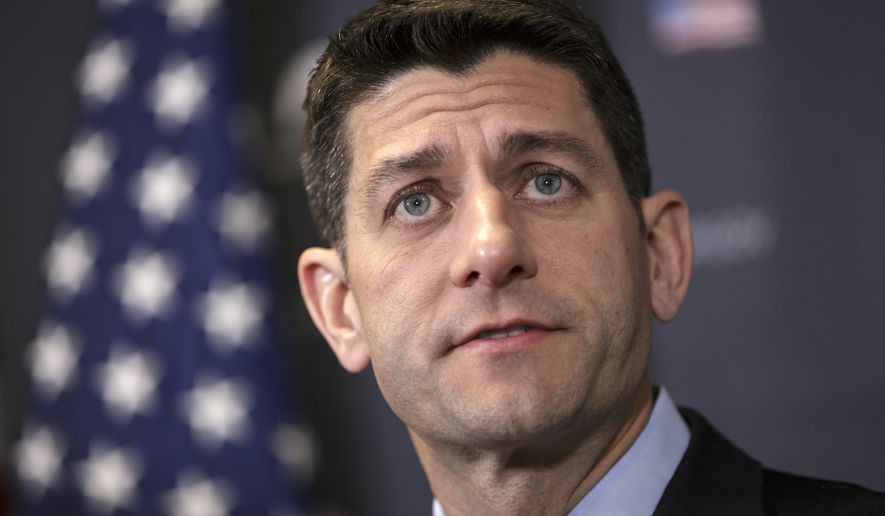From the Zika virus to the contaminated water crisis in Flint to trying to rescue Puerto Rico from its debt crisis, Congress is once again faced with a series of thorny questions over just how much taxpayers will be asked to shell out.
Democrats insist that more money is the answer and say Capitol Hill should approve emergency financing to avert the crises. But conservatives say plenty of money is already available and all sides need to spend it better to combat inevitable problems.
Less than four months into the year, fiscal fights have stalled a bipartisan energy bill in the Senate, forced the White House to shift funds away from the Ebola fight and left Puerto Rico struggling to stay afloat in a sea of red ink.
Trapped in the middle is House Speaker Paul D. Ryan, Wisconsin Republican, who is trying to wrangle his own caucus while holding the line on Democrats’ requests for billions of dollars in supplemental funding.
The fights over spending forced him to miss the April 15 deadline set in law for approving a new budget, as he tried to quell a conservative rebellion over the funding levels agreed to last year.
“We’re still having conversations with our members, and we do want to pass a budget resolution,” Mr. Ryan insisted Thursday — though he acknowledged that the impetus for getting that accomplished has diminished.
But Rep. Dave Brat, Virginia Republican, said Congress can’t begin to entertain Democrats’ supplemental spending requests for Zika or Flint until lawmakers settle on a top spending number.
“Supplemental means ’on top of.’ On top of what?” Mr. Brat said.
Democrats say the situation is already urgent — particularly in the case of Zika, which has been directly linked to birth defects.
“The Republicans’ appalling fecklessness in the face of a frightening public health emergency is beyond dangerous,” House Minority Leader Nancy Pelosi, California Democrat, said Thursday. “It could have devastating consequences for thousands of America’s children and families.”
Conservative activists say any new funding must be offset by cuts elsewhere.
“The federal government is already spending too much money,” said Dan Holler, spokesman for Heritage Action, a conservative group. “If pressing needs arise, lawmakers should reprioritize current spending to meet those needs. So far, so good.”
Mr. Ryan has pushed off those fights, saying lawmakers can’t deal with them later this year as the spending committees write the dozen bills to fund basic government operations for 2017.
It is not unusual for Congress to face sudden or unanticipated costs. Mr. Ryan’s predecessor, John A. Boehner, faced withering criticism in January 2013 from Democrats and Northeast Republicans for not fast-tracking $60 billion in relief for Superstorm Sandy.
Congress has tried to budget for disasters since then but still struggles, said Marc Goldwein, senior vice president at the Committee for a Responsible Federal Budget.
“Just because we don’t know when they will happen or what they will look like doesn’t mean we don’t know they will happen,” he said. “We should do more to prepare on the front end, and if not at least be willing to pay for them over time.”
This year’s fight centers on multiple crises, forcing Republican leaders to justify their response to each one.
Mr. Obama has asked Congress for $1.9 billion to combat the Zika virus, and Democrats tried to attach the money to a veterans spending bill last week. Republicans shot it down.
Mr. Obama’s request “covers practically anything that a bureaucrat wants it to cover. We need detailed information,” said Appropriations Committee Chairman Harold Rogers, Kentucky Republican.
White House press secretary Josh Earnest said the administration has provided those details and that Republicans will clamor for forgiveness when Zika dominates the headlines this summer.
“I don’t know what Republicans are going to say that they did to prepare for it,” he said.
A fight over $300 million in aid to Flint, Michigan, helped derail an energy bill this year. Democrats insisted on sending federal money to Flint to help clean up after lead leached into the city’s water supply, endangering children’s health.
Sens. Debbie Stabenow and Gary Peters, Michigan Democrats, lifted their hold on the energy bill Thursday, allowing it to proceed without the Flint package.
Democrats also tried to add $600 million in drug-fighting money to a bill aimed at stopping the opioids epidemic. They won support of a handful of Senate Republicans but were derailed by the others, who said enough money already is available.
Mr. Ryan’s task of managing got harder last week when his party’s right flank balked at a Republican-authored bill to keep Puerto Rico from drowning in its bond debt.
Opponents of the bill said it rewrote lending rules, even though “progressive socialist” policies led to the island’s predicament, meaning taxpayers would likely be forced to bail out Puerto Rico down the road.
Mr. Ryan rejected that view Thursday, saying the bill imposes an oversight board to avoid an expensive rescue mission later on.
“There will be no taxpayer bailout,” he said at his weekly press conference.
• Tom Howell Jr. can be reached at thowell@washingtontimes.com.




Please read our comment policy before commenting.